PHILADELPHIA, 5 October –- Gamification Lecture 11: Gamification Critiques & Risks. Lecture notes from Kevin Werbach of the University of Pennsylvania’s Wharton Business School, Week 6! Aww, last week already – everybody’s getting nostalgic!
There are many legitimate limitations, concerns, and dangers from gamification. Some of them can be avoided through thoughtful design, but others must be considered directly in any implementation.
Class Notes – Part 11 – Gamification Critiques & Risks
11.1 Pointsification
Gamification Critique: Does gamification really help us learn? Some feel that gamification is taking the least essential aspects. It’s a con. It’s taking the wrong thing from games. The PBL isn’t what’s important.
This is really a critique of the shallower, behavioral aspects of gamification. The PBL, not the whole of what we’ve described. If it’s just driven by surface level mechanics, it won’t endure. “Crowding Out” – making an external attribution that isn’t really about you. Again, simplistic, external reward systems.
So, does gamification Actually Work?
We don’t have much hard data yet, but we do have some compelling anecdotes.
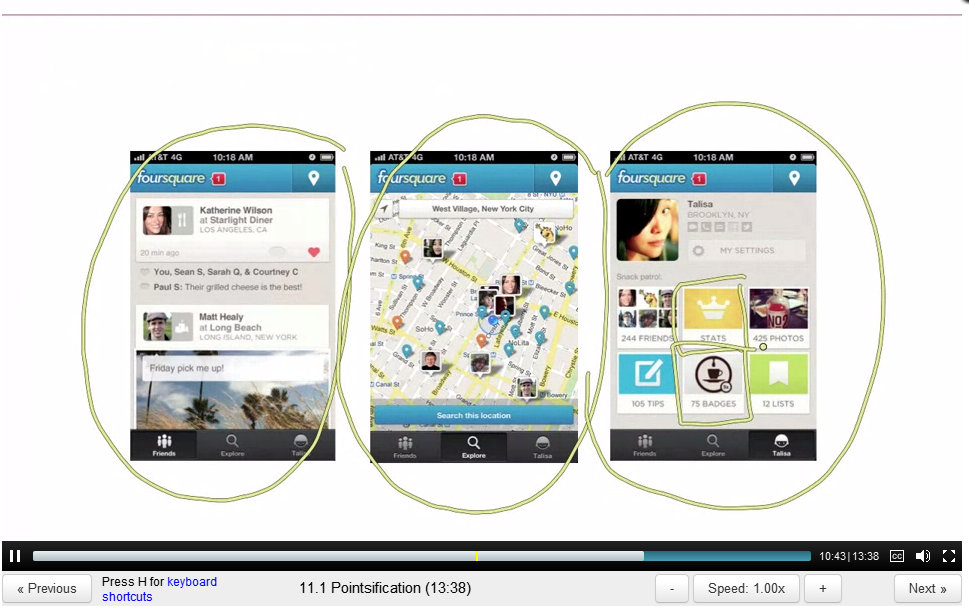
Foursquare was a poster child for gamification success. Early in 2012 they did a site redesign which kept, but significantly downplayed the game elements. — Did they not work? Get old? Did the badges become silly?
Or maybe they needed prominent game elements in early days to motivate peeps to bother to check in during growth phase… now… PBL can be less central, and focus is on monitizing large, active userbase.
• Names are powerful – many game designers hate / take offense at the term “gamification” which perhaps underestimates or devalues their work. But for now, it’s the term we use.
• Bad Gamification is bad
• More to Games than Gamification / More to gamification than games
11.2 Exploitationware
Or, Alternate Gamification Critique: it isn’t ineffective, but TOO effective! > Coerced play.
A way to try to make people think that their job doesn’t suck… when it does! Looking at surface instead of meaningful aspects of job. Undermines nature of economic and social exchange between employers & workers > replace real incentives with fictional ones. Could badges replace better pay and better work conditions?
In, for example, Call Centers, there are both creepy gamification projects, and some that help workers really learn and grow. Gamification designers need to be careful!
Bogost > “Cow Clicker” – had (intentionally) no point – 50,000 people got engaged with it. > Drawn in by habit forming engagement-based systems.
Back to:
• What’s the Business Goal
• Who are the players
11.3 Gaming the game
Don’t forget who the object of your system is > players > human beings, feeling, interacting agents. You can never be sure what they’re going to do. One thing they may do is game the system in ways you never dreamt of.
Sometimes people will cheat. Pursue their own goals instead of yours. Part of “the game” is to accept the rules & not cheat… but in gamified systems… easy for people to feel like the game that THEY are playing is different.
More social gamification spaces see less cheating.
• Live with it
• Try to design it out
Can there be beneficial cheating?
> Virtual “Insider Trading” can strengthen great ideas
— try to find ways players can “exercise their autonomy” yet get to the same result that the system was originally designed to accomplish.
11.4 Legal issues
haha Werbach actually has a law degree! 🙂
–> Legal & Regulatory Considerations
1. Privacy
you’re going to get lots of information about your players, their background, and what they’re doing. Be careful with personally identifiable information.
2. Employment / Labor Law Issues
3. Deceptive Marketing
– Jesse Schell’s famous talk
– if gamified system isn’t clearly designed to market – may be concern that it’s a deceptive practice.
4. Intellectual Property
it’s possible in designing a gamified system you could be ripping off someone else’s IP.
Do virtual goods / assets have some legal value? What if a user spends lots of time, effort, money to get something? Can the designer take it away? Does the user have any legal claim? As if someone sold you a physical object and then took it away?
So far the courts have said not really – that it’s a license not property. But this is an evolving area.
11.5 Regulatory issues
like the legal issues, they become particularly serious when there’s money involved.
Paid Endorsements. eg. bloggers given freebies and writing glowing reviews – Federal Trade Commission implemented rules requiring disclosure. >> one way gamified systems give points is through recomendations!
Virtual Currency >> Banking… Regulation!
you as a service provider may not be permitted to engage in this activity unless you’re registered as a bank. Not generally the goal of most gamified systems. Only probably a problem if real money is going in or out of system.
Gambling & Sweepstakes
different US States have different sweepstakes laws
Gambling is regulated federally – and largely prohibited
in other countries gambling is permitted but regulated
>> IF a gamified system seems like gambling
gambling law distinguishes between games of Skill & games of Chance
Skill – gambling laws don’t necessarily apply in same way
if skill & chance both apply – might want to seek counsel!
Optional Materials
• Ian Bogost, Persuasive Games: Exploitationware, Gamasutra, May 3, 2011
• Sebastian Deterding Pawned: Gamification and its Discontents (presentation) Playful 2010
• Margaret Robertson, Can’t Play, Won’t Play, Hide&Seek Blog, October 6, 2010
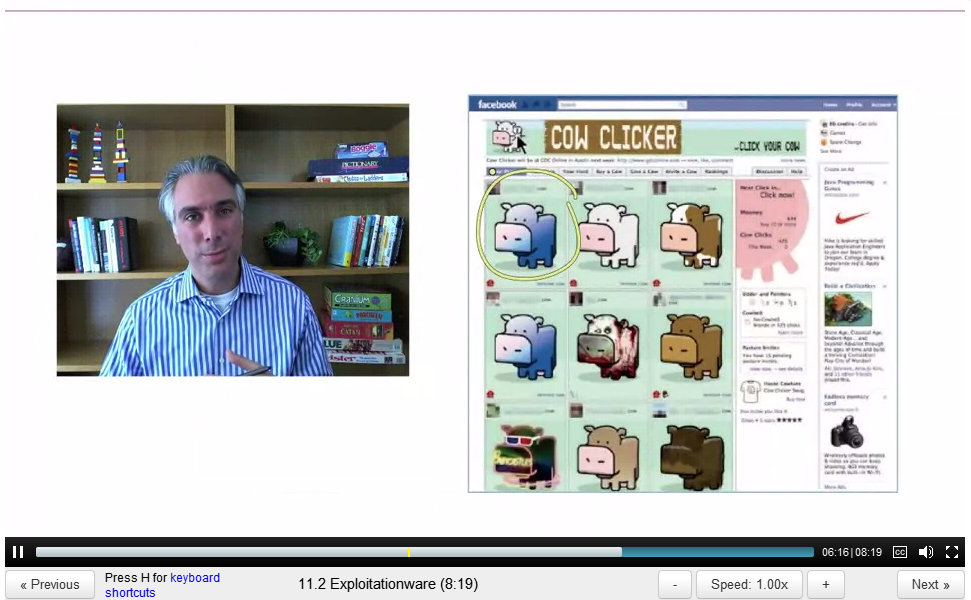
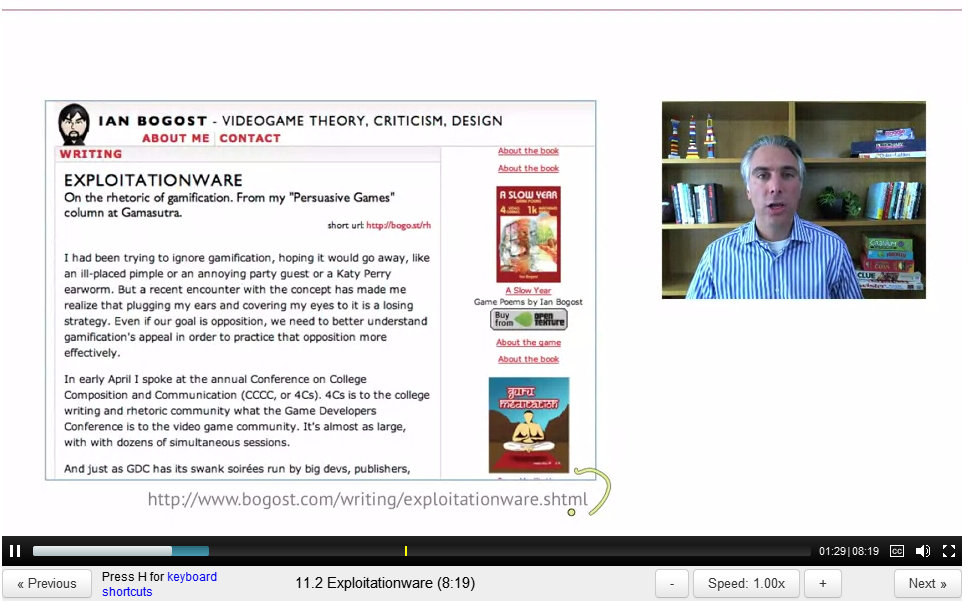
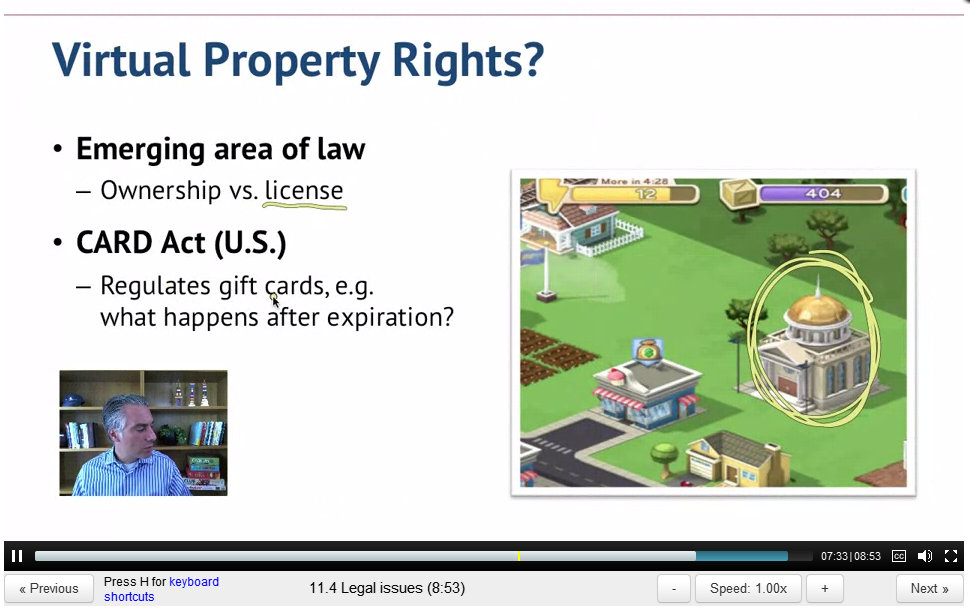
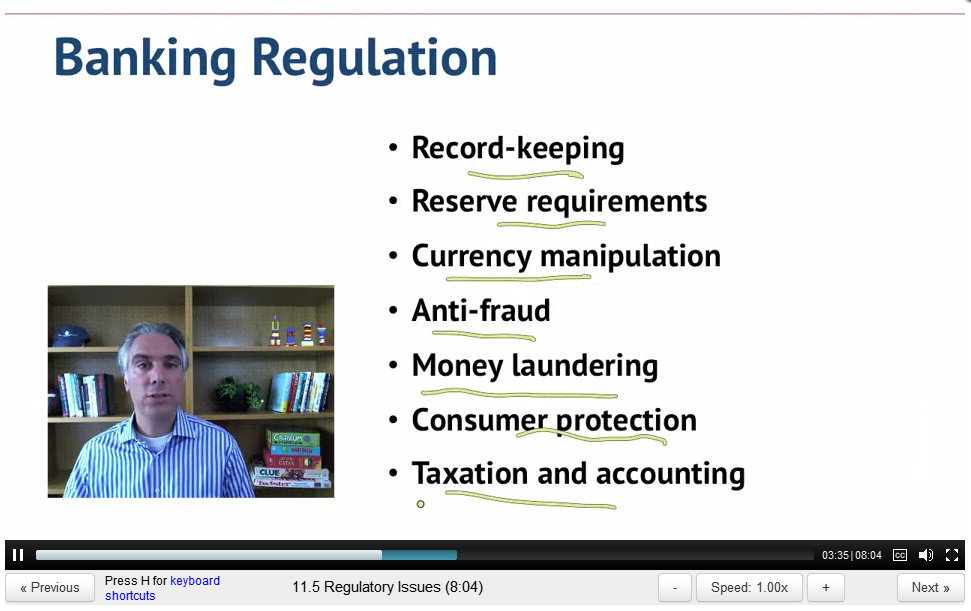













Hi Vaneeesa!! You know I love this whole Gamification series, but wow do I have a lot to catch up on. Great work!
Aww, thanks so much Yordie! I’m sorry they’re really just “virtual hand scratched notes” and not better or more clearly or more completely written. I just open a wordpress window and type while he talks so it’s all kind of rough.
Although the lecture screenshots in the top slider (haha, now that I figured out how to get them in the right sequence) are actually a decent outline of what was covered.
Anyway… WELCOME BACK YORDIE!!!
Handscratched notes or not, this is all a brave new world to me. I’m not sure where it will take me but I’m thinking my human might take a technological journey into Gamification. As with all my activities, I have no idea where I’d be headed tho. heh
The Coursera course on Gamification is ending this week. But you can actually still “enroll” (free). It’s too late to take it for a certificate, but you can enroll and access all the video lectures. There is, as you can see from my notes, 12 “lectures” each broken into 5 or 6 10-minute or so video clips. So you can just sift through and watch the ones you’re curious about… or watch them all if you get into it.
https://www.coursera.org/course/gamification
To be fair, the previous gamification talks I’d been to were far less than 12 hours, so Kevin Werbach has a lot more time to be detailed and nuanced. But I must say, while I think I did recognize the power of gamification right away, I was largely creeped out by the Orwellian overtones and the idea, as Gabe Zichermann so gleefully put it, that “Intrinsic motivation is OVER!”
Werbach has a much more nuanced and detailed survey of this landscape. And far from claiming that extrinsic motivation is the death of intrinsic motivation (doing stuff for rewards / prizes rather than for love, like taking a class to get an “A” rather than a quest for knowledge) he really argues that over time, extrinsic motivators are difficult to maintain, and that the most compelling effects are when you can Amplify Intrinsic motivation.
As presented by Werbach I found gamification both powerful and inspiring.
my human was creeped out by Orwellian overtones, being so heavily involved in computer technology for so long, But once I got past that, I’ve had little trouble with AI, databases, robots, Internet or anything. We are headed into the brave new world and I see so many things that lead me to believe we will surpass Orwell before it’s all said and done. heh
If I have any extra time (heh) I’ll sign up but odds are I’ll approach gamification the same way I do everything, in a thoroughly haphazzard fashion. I think I’ll go back to Part 1 again though. I was so inspired by those vids.
ah yes, the superInspiring Jane McGonigal videos! You know you can sign up for her website, SuperBetter! 🙂
https://www.superbetter.com
Especially Jane McGonigal!! I’m gonna try playing some WoW, I swear I am.